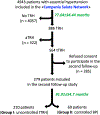Therapeutic concordance improves blood pressure control in patients with resistant hypertension
- PMID: 36402254
- PMCID: PMC9943685
- DOI: 10.1016/j.phrs.2022.106557
Therapeutic concordance improves blood pressure control in patients with resistant hypertension
Abstract
Introduction: An empathetic approach may be particularly useful in patients with therapy-resistant hypertension (TRH), defined as the failure to achieve target blood pressure (BP) despite a maximal doses of 3 antihypertensive drugs including a diuretic. However, the effects of therapeutic concordance have not been determined in hypertensive patients.
Methods: We designed a study to explore the impact of therapeutic concordance in patients with TRH, who were included in an intervention arm based on a protocol in which trained personnel periodically verified the pharmacological regimen of these patients.
Results: From a cohort of 5331 hypertensive patients followed-up for 77.64 ± 34.44 months, 886 subjects were found to have TRH; of these, 322 had apparent TRH (aTRH: uncontrolled office BP but optimal home BP) and 285 refused to participate in a second follow-up study, yielding a population of 279 patients with true TRH (tTRH). These tTRH patients were followed according to the therapeutic concordance protocol for 91.91 ± 54.7 months, revealing that 210 patients (75.27%) remained with uncontrolled BP (uncontrolled tTRH, Group I) while 69 patients (24.73%) reached an optimal BP control (average BP <140/90 mmHg in at least 50% of follow-up visits, Group II). Strikingly, at the end of the second follow-up, the percentage of patients displaying a decline in kidney function was significantly smaller in Group II than in Group I (8.5% vs 23.4%, p < 0.012).
Conclusions: Taken together, our findings indicate for the first time that therapeutic concordance significantly improves the outcome of antihypertensive treatment in a population of patients with TRH.
Keywords: Adherence; Blood pressure; Concordance; EGFR; Hypertension; Pharmacologic resistance.
Copyright © 2022 The Authors. Published by Elsevier Ltd.. All rights reserved.
Conflict of interest statement
Conflict of interest None.
Figures


Similar articles
-
The therapeutic concordance approach reduces adverse drug reactions in patients with resistant hypertension.Front Cardiovasc Med. 2023 May 5;10:1137706. doi: 10.3389/fcvm.2023.1137706. eCollection 2023. Front Cardiovasc Med. 2023. PMID: 37215551 Free PMC article.
-
Prevalence of Apparent Therapy-Resistant Hypertension and Its Effect on Outcome in Patients With Chronic Kidney Disease.Hypertension. 2015 Nov;66(5):998-1005. doi: 10.1161/HYPERTENSIONAHA.115.05694. Epub 2015 Sep 8. Hypertension. 2015. PMID: 26351024
-
Treatment Resistant Hypertension.Ethn Dis. 2015 Nov 5;25(4):495-8. doi: 10.18865/ed.25.4.495. Ethn Dis. 2015. PMID: 26674466 Free PMC article. Review.
-
Prevalence of optimal treatment regimens in patients with apparent treatment-resistant hypertension based on office blood pressure in a community-based practice network.Hypertension. 2013 Oct;62(4):691-7. doi: 10.1161/HYPERTENSIONAHA.113.01448. Epub 2013 Aug 5. Hypertension. 2013. PMID: 23918752 Free PMC article.
-
Role of aldosterone blockade in resistant hypertension.Semin Nephrol. 2014 May;34(3):273-84. doi: 10.1016/j.semnephrol.2014.04.004. Epub 2014 Apr 28. Semin Nephrol. 2014. PMID: 25016399 Review.
Cited by
-
The therapeutic concordance approach reduces adverse drug reactions in patients with resistant hypertension.Front Cardiovasc Med. 2023 May 5;10:1137706. doi: 10.3389/fcvm.2023.1137706. eCollection 2023. Front Cardiovasc Med. 2023. PMID: 37215551 Free PMC article.
-
Optimizing hypertension management in China: care cascade insights and individual determinants from a national survey.Curr Med Res Opin. 2025 May;41(5):741-751. doi: 10.1080/03007995.2025.2502674. Epub 2025 Jun 5. Curr Med Res Opin. 2025. PMID: 40471694 Free PMC article.
-
Tirzepatide: A Systematic Update.Int J Mol Sci. 2022 Nov 23;23(23):14631. doi: 10.3390/ijms232314631. Int J Mol Sci. 2022. PMID: 36498958 Free PMC article. Review.
-
A Randomized, Multicenter, Double-blind, Placebo-Controlled Study to Evaluate the Efficacy and Safety of a Quadruple Combination of Amlodipine, Losartan, Rosuvastatin, and Ezetimibe in Patients with Concomitant Essential Hypertension and Dyslipidemia.Am J Cardiovasc Drugs. 2023 Jul;23(4):441-454. doi: 10.1007/s40256-023-00590-9. Epub 2023 Jul 3. Am J Cardiovasc Drugs. 2023. PMID: 37395974 Free PMC article. Clinical Trial.
-
Estimated impact of guidelines-based initiation of dual antihypertensive therapy on long-term cardiovascular outcomes in 1.1 million individuals.Eur Heart J Cardiovasc Pharmacother. 2025 Jan 11;10(8):697-707. doi: 10.1093/ehjcvp/pvae048. Eur Heart J Cardiovasc Pharmacother. 2025. PMID: 38982312 Free PMC article.
References
-
- DeMaria AN, Adherence, compliance, concordance, or the lack thereof, J. Am. Coll. Cardiol 59 (2012) 1120–1121. - PubMed
-
- Murphy J, Coster G, Issues in patient compliance, Drugs 54 (1997) 797–800. - PubMed
-
- Randall S, Neubeck L, What’s in a name? Concordance is better than adherence for promoting partnership and self-management of chronic disease, Aust. J. Prim. Health 22 (2016) 181–184. - PubMed
Publication types
MeSH terms
Substances
Grants and funding
LinkOut - more resources
Full Text Sources
Medical
Research Materials
Miscellaneous

